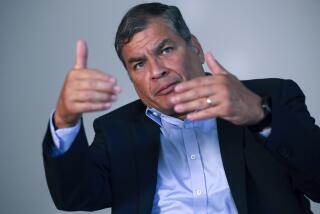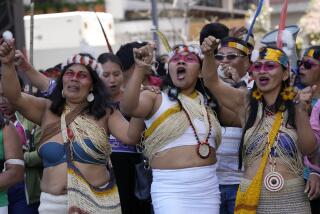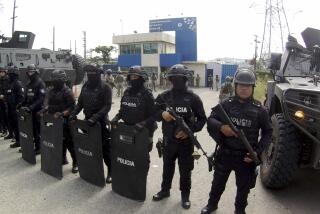Bush Confronts Iran Arms Questions in Ecuador
- Share via
QUITO, Ecuador — Vice President George Bush, dogged even in this earthquake-ravaged country with questions about the Iran- contra affair, insisted to reporters Sunday that there is “no way” the scandal will bring down the Reagan Administration as Watergate did President Richard M. Nixon.
Bush met with Ecuadorean President Leon Febres Cordero to discuss U.S. relief efforts in the wake of devastating earthquakes that hit rural Ecuador more than two weeks ago.
But while the session was meant to rally support for Febres Cordero’s government, it was Bush’s own problems stemming from the Iran-contra issue that dominated a news conference afterward. Half the questions from local reporters concerned the controversy and Bush’s role in it.
Asked in Spanish whether the affair might end as Watergate did, the vice president replied through a translator: “No way. This President enjoys great support from the American people and there is no comparison.”
Bush also expressed relief that President Reagan had clarified his statement at Thursday night’s news conference that Bush had never objected to U.S. arms sales to Iran--a clear contradiction with Bush’s own assertion that he had expressed “certain reservations” about “certain aspects” of the policy.
In a statement Friday, the President said Bush “had expressed reservations throughout the process, but had supported the decision and the policy.”
The issue is a particularly touchy one for Bush, who is mounting a presidential campaign at a time when the controversy has called his foreign policy judgment into question. “I was very pleased that the White House cleared it up so well,” he said. However, Bush continued to refuse comment on what types of warning he had offered Reagan.
In addition to its stated goal of disaster relief, Bush’s 4 1/2-hour visit held political significance as an effort to bolster the embattled government of Febres Cordero, one of the Administration’s staunchest allies in the region.
Bush praised the Ecuadorean president, who assumed office in August, 1984, as “a man of fierce determination,” and said it is “dramatically important to his friends and some great supporters of democracy here that he finish his term.”
A senior Administration official traveling with the vice president described Ecuador as having “some of the most vicious politics in the hemisphere. . . . There was a political truce after the earthquake, but it didn’t last long.”
Back-to-back quakes shook the remote, two-mile-high jungled slopes of the Andes on March 5. They were followed by more than 500 aftershocks, triggering mud slides and floods that left about 1,000 people dead or missing, according to government sources. About 70,000 people are believed to be isolated in outlying Napo Province alone.
The disaster also dealt a heavy economic blow to a country already crippled by falling prices for oil, which provides more than 60% of its government revenues.
The quake ruptured the pipeline that carries the nation’s oil from the interior jungles and shut down the major road to that region.
Ecuador had already missed a January installment on its foreign debt, and the quake forced Febres Cordero to officially suspend payment. He also froze prices on food, while increasing those of fuel, gasoline and public transportation.
Meanwhile, Febres Cordero has come under sharp criticism for his handling of the relief effort, which is said to be moving slowly and inefficiently.
Critics have also said the government is more worried about rebuilding the pipeline to restore oil revenues than easing human suffering.
Ecuador has a turbulent political history and had a military government during most of the 1970s. Febres Cordero, the second elected president under restored civilian rule, has maintained shaky control and, as recently as January, was held hostage briefly by a faction of his own air force.
The U.S. government is expected to turn down an Ecuadorean request for Defense Department Chinook helicopters, which one U.S. official said would be an expensive option and “a really inappropriate one” for the problems created by the earthquake.
However, the United States plans to pledge several million dollars in new aid on top of the $356,000 in disaster relief it already has provided. Bush also promised to press for more aid from multilateral agencies, particularly the World Bank, to help repair the estimated $1-billion damage to the country and its oil industry.
Bush said the United States would help rebuild destroyed bridges leading to Napo Province. Also under consideration is the use of the U.S. National Guard to help finish an alternative southern route to the affected provinces. The existing northern route is so badly damaged that it cannot be rebuilt for years, a U.S. official said.
More to Read
Sign up for Essential California
The most important California stories and recommendations in your inbox every morning.
You may occasionally receive promotional content from the Los Angeles Times.












